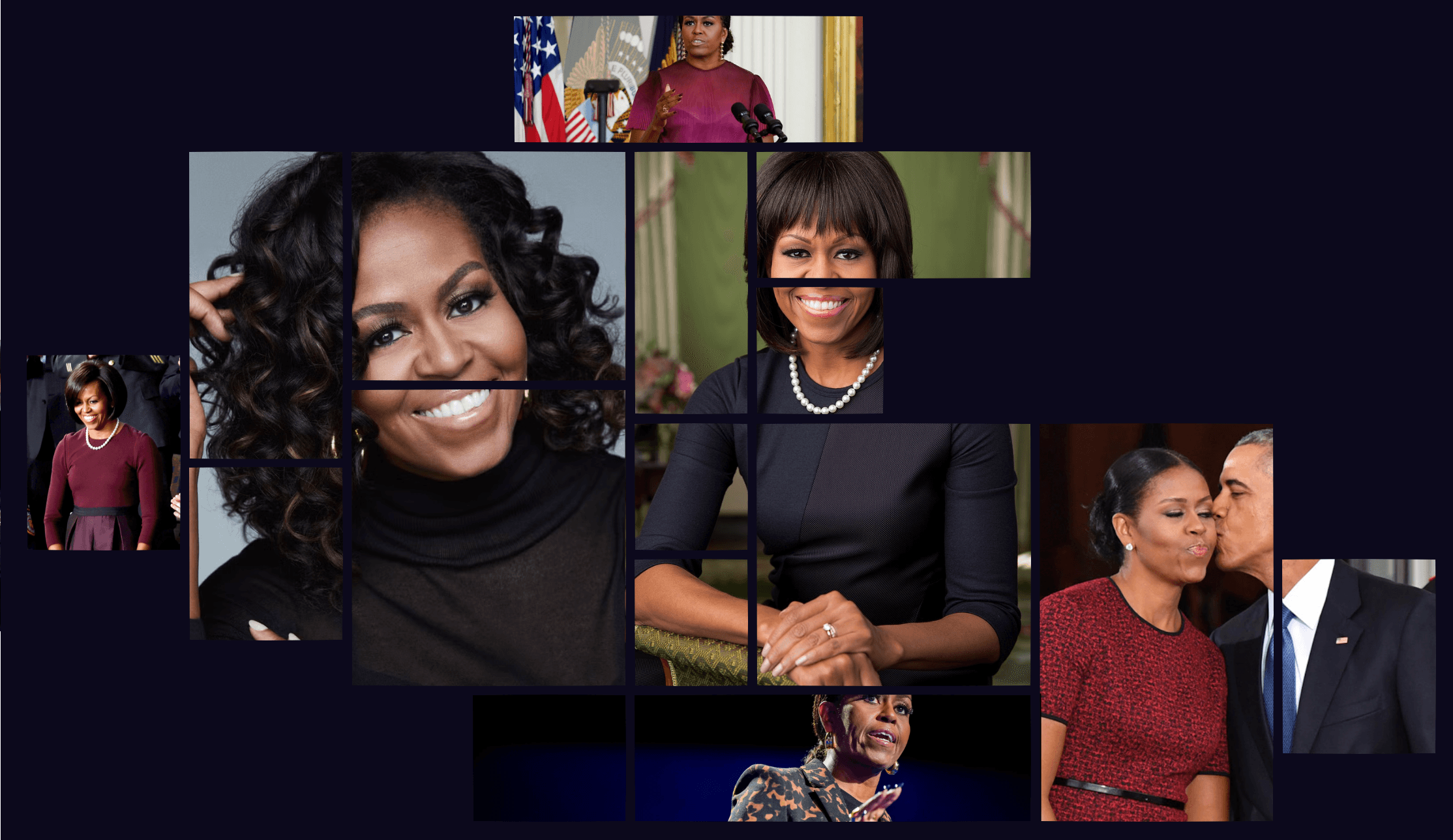Elder voices of the Millenium: Michelle Obama
Sara Srifi
Wed Aug 27 2025

Explore Elder voices of the Millenium: Michelle Obama's impact, hopes, and disillusionment with Obama's presidency and legacy.
Thinking back to the early 2000s, Barack Obama really captured the attention of a generation. Many young people felt he understood their hopes and worries. His cool style and the way he spoke made him seem different from other politicians. This feeling was especially strong with millennials, who were looking for someone to guide them through uncertain times. Michelle Obama also played a big part in this, becoming a relatable figure for many.
Key Takeaways
- Barack Obama's early message and celebrity-like appeal connected strongly with millennials, offering a sense of hope and change.
- Initial enthusiasm for Obama's presidency faded for some millennials as promised sweeping changes didn't fully materialize, partly due to political opposition and economic struggles.
- Economic challenges, like rising student debt, impacted millennials' prospects during Obama's term, leading to some disappointment with policy outcomes.
- Critiques emerged regarding Obama's political approach, with some feeling his ambition was too moderate and legislative wins were not lasting.
- Obama's post-presidency has seen a shift towards content creation and maintaining influence through celebrity, rather than direct political action, leaving some feeling a disconnect from his earlier community organizer roots.
Elder Voices of the Millennium: Michelle Obama's Impact
When Barack Obama first ran for president, there was this incredible energy, especially among younger voters. It felt like a real moment, you know? He wasn't just another politician; he seemed to get us. His story, from his dad being an immigrant to his own journey, felt relatable. He wrote "Dreams From My Father" before he was even in office, which gave people a real look into who he was. It wasn't just about policy; it was about a person who seemed to genuinely want to make things better.
The Allure of Obama's Messaging
Obama's words had this way of drawing people in. It wasn't just empty promises; it felt sincere. People felt heard, and that's a big deal, especially for a generation that had seen a lot of ups and downs. His speeches often had this hopeful tone that really connected, making complex ideas feel accessible and inspiring.
Calculated Cool and Celebrity Status
Beyond the speeches, there was this undeniable 'cool' factor. He could be in a room with famous musicians and still come across as completely at ease, like he belonged there. It wasn't just about being a politician; it was about having this presence that felt modern and, frankly, pretty impressive. This celebrity vibe, at the time, seemed like a positive thing, adding to his appeal.
Addressing Millennial Concerns
What really stood out was how Obama seemed to address issues that mattered to millennials. It felt like he was speaking directly to our experiences and worries. He didn't talk down to us; he acknowledged the challenges we faced and offered a vision that felt inclusive. This direct engagement made a huge difference in how people, especially younger ones, viewed his candidacy and presidency.
The Obama Presidency: Hope and Shifting Expectations
The election of Barack Obama in 2008 was a moment charged with immense hope, especially for millennials. Many saw his presidency as a chance for real change, a departure from the political norms that had preceded him. His message of hope and his connection with younger voters felt different, almost revolutionary. It was easy to get swept up in the idea that a new era was dawning, one that would address the anxieties and aspirations of a generation facing economic uncertainty and a changing world. The initial enthusiasm was palpable, with young voters turning out in record numbers, eager to be part of something historic. It felt like a genuine generational connection was being forged, a shared vision for the future.
Early Enthusiasm and Generational Connection
Barack Obama's campaign tapped into something special with young voters. His use of social media and grassroots organizing was groundbreaking, making politics feel more accessible and relevant than ever before. For many millennials, he wasn't just a politician; he was a symbol of progress and possibility. His personal story, detailed in works like Dreams From My Father, resonated with a generation looking for authenticity. This connection was so strong that many felt he understood their concerns and could lead the way toward a better future. It was this unique appeal that drew so many to his cause, making them feel like active participants in a movement for change. This early engagement set a high bar for what many expected from his time in office, as detailed in discussions about Michelle Obama's early relationship.
The Disillusionment of Unmet Change
However, as the presidency progressed, the reality of governing began to set in. The sweeping changes many had hoped for seemed to stall, bogged down by political realities and resistance. For some, the initial idealism started to fade as the administration grappled with complex issues and faced significant opposition. The slow pace of change and the compromises required in Washington led to a sense of disappointment for those who had invested so much hope. It felt like the bright promise of the campaign was being tempered by the harshness of political stalemate. This shift from fervent hope to a more tempered outlook was a common experience for many.
Economic Realities for Millennials
The economic landscape during Obama's presidency presented significant challenges for millennials. Graduating into a slow economic recovery and facing mounting student loan debt, many found their financial futures uncertain. While the administration achieved notable successes, such as expanding healthcare access and addressing climate change through agreements like the Paris Accord, the economic struggles persisted for many young people. The ballooning student debt, reaching $450 billion during his tenure, significantly impacted their ability to start careers and build wealth. This created a disconnect between the broader national progress and the personal economic realities faced by a generation.
| Achievement Area | Impact on Millennials |
|---|---|
| Healthcare Access | Lowest uninsured rate in decades |
| Student Debt | Increased significantly, impacting financial prospects |
| Job Market | Slow recovery, uneven opportunities |
| Economic Policy | Efforts to stabilize the economy amid recession |
The gap between the soaring rhetoric of change and the often-grinding reality of policy implementation became a source of frustration for many who had eagerly supported the president. What felt like a personal betrayal of idealism for some was, for others, a stark lesson in the complexities of presidential power and the enduring nature of political inertia.
Critiques and Evolving Perceptions of Obama's Tenure
Even with the initial excitement, it wasn't all smooth sailing. As Obama's presidency unfolded, some of the grand promises started to feel a bit distant. Millennials, who had really bought into the idea of sweeping change, began to feel a disconnect. It seemed like the political realities of Washington, and maybe even Obama himself, were pulling him away from that initial, bright-eyed idealism. The resistance from Republicans made a lot of the legislative wins feel shaky, and honestly, the country's economic recovery wasn't exactly a sprint. Student debt kept piling up, making it tough for young people trying to start their careers.
Political Ambition Versus Momentary Needs
There was this feeling that Obama's political goals, while perhaps ambitious in the long run, didn't always match the immediate needs and desires of his younger supporters. While he achieved significant things, like expanding healthcare access and pushing for climate action through the Paris Agreement, some felt his approach was too cautious. The push for a public option in the Affordable Care Act, for example, didn't make it, which left many young progressives feeling let down. It’s like the system itself, or maybe the need to compromise, dulled the edge of the change that was so eagerly anticipated. This gap between the initial vision and the on-the-ground reality led to a noticeable shift in how some millennials viewed his time in office.
Fragile Legislative Victories
Looking back, some of the landmark achievements of the Obama administration, while important, proved to be quite fragile. The Affordable Care Act, for instance, faced constant challenges, and its future became uncertain after the 2016 election. Similarly, efforts to reform the justice system and address environmental issues, while significant, were often met with strong opposition, making their long-term impact less secure. It highlights a broader challenge: how to translate bold policy ideas into lasting change when faced with political division.
The Legacy of the Obama Years
It's complicated, right? On one hand, you have undeniable progress: lower uninsured rates, steps toward addressing climate change, and advancements in LGBTQ+ rights. But then there's the other side – the economic struggles many millennials faced, the feeling that some of the promised change didn't fully materialize, and the political landscape that shifted dramatically after his term. It makes you wonder about the lasting impact and whether the foundation laid was strong enough to withstand future challenges. The commentary often highlights the symbolic significance of his role as the first African American First Lady, a point of pride for many, but the policy outcomes are where the critiques often land. Symbolic significance of role
Obama's Post-Presidency and Continued Influence
After leaving the White House, Barack Obama has largely stepped back from the day-to-day political fray, a move that has surprised some who expected him to remain a dominant voice. Instead, he's shifted his focus, and it's interesting to see how that's playing out. His approach seems to be about building a foundation for future progress rather than direct intervention.
Shying Away from Direct Influence
It's been noted that Obama isn't one to jump into every political debate. He's not constantly tweeting or holding press conferences to weigh in on current events. This deliberate distance allows him to observe and perhaps strategize without the immediate pressure of the presidency. It’s a different kind of leadership, one that’s less about being in the spotlight and more about quiet influence. He seems to be letting others take the lead, which is a significant change from his time in office.
The Shift to Content Creation
One of the most visible aspects of his post-presidency is the move into content creation. Through the Obama Foundation, he's been involved in various projects, including documentaries and podcasts. This allows him to share his stories and perspectives in a more personal way. It’s a smart move, really, connecting with people on a different level. His memoir, A Promised Land, also offered a deep dive into his experiences, becoming a bestseller and giving many a closer look at his journey. This focus on storytelling is a way to keep his message alive and relevant.
Celebrity and Public Perception
Obama’s celebrity status hasn't faded; if anything, it's grown. He's still a highly recognizable and admired figure globally. This public perception plays a big role in his continued influence. He can still draw crowds and command attention, even without holding an official title. It’s a unique position, being a former president who remains a cultural icon. His ability to connect with younger generations, a trait that defined his presidency, seems to continue in his post-presidency through these new avenues. He remains a significant figure in the public eye, and how he uses that platform will be interesting to watch as time goes on. His work with the Obama Foundation continues to be a major focus.
Millennial Disappointment and the Motion of History

It’s easy to look back at the Obama years and see a generation brimming with hope, ready to embrace change. Millennials, in particular, turned out in huge numbers in 2008 and 2012, believing in the promise of a new era. But as time went on, that initial excitement started to fade for many. The reality of political opposition, economic struggles, and policies that didn't quite match the lofty ideals began to set in.
The Gap Between Idealism and Reality
Many young people felt that the promised transformation didn't fully materialize. While Obama's presidency was historic, the day-to-day changes they hoped for, like significant shifts in economic opportunity or policy, seemed slow to arrive or were met with strong resistance. This created a disconnect between the hopeful vision and the lived experience.
The Rise of Donald Trump
The political landscape shifted dramatically after Obama. The election of Donald Trump, for many, felt like a direct repudiation of the progress and ideals that Obama represented. This transition highlighted how quickly political fortunes could change and how the initial optimism of the Obama era could be overshadowed by new, often opposing, political forces. It left many wondering if the change they believed in was truly sustainable.
Growing Up and Redefining Hope
As millennials have aged, their perspective has evolved. The initial, perhaps more idealistic, hope has been tempered by real-world challenges. The generation that expected to surpass their parents' economic standing has instead faced stagnant wages and mounting debt. This has led to a reevaluation of what hope means in a more complex and often challenging historical context. It's less about a single leader and more about systemic change and resilience in the face of ongoing societal shifts.
The Obama Phenomenon and Millennial Voters

It’s easy to forget just how much of a phenomenon Barack Obama was, especially for young voters. Back in 2008, he really connected with millennials. He felt like one of us, or at least, someone who got us. His story, his background, even his cool demeanor – it all seemed to speak directly to a generation that felt a bit overlooked by traditional politics. He wasn't just a candidate; he felt like a movement.
Unprecedented Engagement with Young Voters
Obama's campaign was a masterclass in reaching out to young people. Forget the usual political rallies; his team used social media in ways that were totally new back then. They understood that millennials lived online, and they met them there. This direct line of communication, bypassing traditional media gatekeepers, was a game-changer. It made politics feel more accessible and less like something happening to us, and more like something we could be a part of. It wasn't just about getting votes; it was about building a community.
Hopes for Policy and Social Change
Beyond the charisma, there were real hopes tied to Obama's presidency. Millennials were looking for concrete action on issues that mattered to them: the economy, climate change, social justice. We wanted to see a real shift, a departure from the old ways of doing things. The promise of change was powerful, and many of us believed it could translate into tangible improvements in our lives and the world around us. It was a time of high expectations, a feeling that maybe, just maybe, things could actually get better.
Re-election Support and Future Trends
While the initial fervor of 2008 was immense, Obama still commanded significant support from young voters in his 2012 re-election. This was crucial for his victory. However, even then, there were whispers about whether this level of engagement could be sustained. The political landscape was shifting, and the unique
Looking Back, Moving Forward
So, what's the takeaway from the whole Obama era for millennials? It’s a mixed bag, for sure. There was so much excitement, so much hope for real change, and Obama definitely delivered on some big things, like healthcare and LGBTQ+ rights. But for many, the big, sweeping changes they dreamed of just didn't fully materialize. The economy was still a struggle, student debt kept piling up, and political roadblocks made progress feel slow. It’s like that feeling when you’re really hyped for something, and then reality hits a little differently. Still, even with the letdowns, the Obama years were a defining moment, shaping how a generation saw politics and their own power. It’s a reminder that even when the big dreams don't pan out exactly as planned, the journey itself teaches us a lot about what we really want and what we’re willing to work for.
Frequently Asked Questions
Why were millennials so drawn to Barack Obama's initial campaign?
Many young people felt excited and hopeful about Barack Obama's message of change. They saw him as someone who understood their concerns and represented a fresh start for the country. His cool style and celebrity status also made him appealing to them.
What caused some millennials to feel disappointed with Obama's presidency?
When Obama became president, many millennials expected big, fast changes. However, the actual progress was slower than they hoped. Political challenges and the slow recovery from economic problems made some feel disappointed.
How did people's views on Obama's presidency change over time?
Some critics felt Obama's actions didn't always match the grand promises of his campaign. While he achieved some important things like healthcare reform, others felt his approach was too cautious, especially when facing opposition.
How has Obama's role changed since he left the presidency?
After leaving office, Obama shifted his focus. Instead of directly leading political movements, he and his wife started a production company to create content. This move, along with his continued public presence, keeps him influential but in a different way.
What was the main reason for millennial disappointment with the 'Hope and Change' message?
Millennials hoped for significant societal and policy changes. When these didn't happen as quickly or as fully as expected, many felt let down. This feeling, combined with other factors, contributed to a shift in the political landscape.
How did Obama connect with and mobilize young voters?
Obama's campaign saw huge support from young voters, more than ever before. They were hopeful for new policies and social progress. Even though some were later disappointed, this strong support was key to his victories.
previous
Understanding Soul Ties: What They Are and How to Identify Them
next
Navigating the Nuances: Understanding Your Platonic Relationship
Share this

Sara Srifi
Sara is a Software Engineering and Business student with a passion for astronomy, cultural studies, and human-centered storytelling. She explores the quiet intersections between science, identity, and imagination, reflecting on how space, art, and society shape the way we understand ourselves and the world around us. Her writing draws on curiosity and lived experience to bridge disciplines and spark dialogue across cultures.
More Articles

The Digital Convergence: When Images Became Everything, Everywhere, All at Once

Modern Revolutions and the Digital Explosion: Images That Shattered and Rebuilt Reality

Renaissance Humanism and the Birth of the Modern Gaze: Images That Taught Us to See Ourselves

When Vision Becomes Destiny: The First 25 Images That Shaped Human Consciousness

What a Small Indian Village Teaches the World About Sustainability





